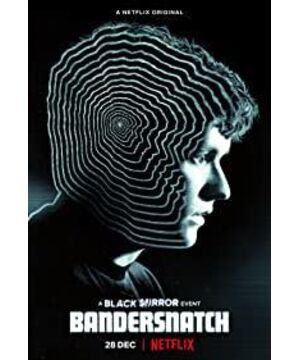Black Mirror: Bandersnatch, launched by streaming platform Netflix in 2018, is an interactive film with complex narrative threads and multi-directional endings, with a total of 16 main endings, each of which requires viewing Players make choices, some choices have nothing to do with the development of the plot, and some choices can trigger different branch plots. Such interactive movies are not uncommon. The hypertext narrative mode of "game + movie" is adopted to allow the audience to participate in the creation process of "movie viewing experience". However, "Black Mirror" has mature technology, smooth plot narrative, and uses A narrative similar to "meta-movie" breaks down the wall between the film's content and the viewer's experience, endows the viewer's subject with duality with a thoughtful analogy, and resuspends the individual person in the For the black hole of freedom.
1. The refined prison of meta-movie narrative
The theory of "meta-movie" was introduced into the field of film and television from novels, referring to "movies about films", with films as the content, directly citing, borrowing, and referring to other film texts in the text to reflect the production process of the film itself, There is a parallel analogy between the form of the film and the content of the film. In "Black Mirror", the game "Bandersnatch" written by the protagonist Stephen is not only the name of the movie, but its mode is also the same as the mode of the movie - the audience and the game player, like the game player, by making choices at key points The development of the game's plot and its different endings are influenced by the development of the game's plot, and the story of the interactive game is told in the mode of interactive film. The narrative of this so-called "meta-interactive film" neatly embeds the world inside and outside the film screen into the delicate analogy. The term "black mirror" originally refers to the screens of modern electronic devices such as mobile phone screens and computer screens. In the mirror analogy, the protagonist Stephen is the viewer, the game "Panda Naiski is the movie, and the demon that the hero is afraid of facing the real control over everything is Netflix, which has huge data and traps countless people. In virtual world streaming platforms. Almost every line in the movie follows this narrative pattern. Netflix even has a more ironic attempt at one or two narrative lines, for example, Stephen, who has been delusional about being in control, receives A message from the future, Netflix appeared on his computer screen, describing what the audience was doing - controlling Stephen's every move in front of the screen. The intersection of parallel mirrors on and off the screen broke the boundaries between the real world and the fictional world, At this moment, the audience before Black Mirror must have shuddered, questioning the authenticity of their own existence and freedom between reality and nothingness.
The narrative mode of meta-movie makes the suggestion of the theme of "choice" constantly appear in the film: formally, the windowed presentation mode is a two-way or even multi-directional peep, the audience can interrupt, return, resume at any time, make Choose, regret and then continue to choose; the content is completely opposite, Stephen's father and colleagues are constantly emphasizing that "there is only one chance in life" and "there is no second choice", this comparison is intended to highlight the contradiction of "choice" itself Sex, the inner film text and the outer video game program text are opposites and unity, which coincides with the core of meta-film: deconstruction of objects and resistance to traditional narrative. Not only that, but the audience's choice also has a kind of contingency that is almost a joke. Some choices in the plot setting have no effect on the development of the whole plot. When Stephen took antidepressant drugs, he thought that taking the drugs would affect his creation. This is two of them. The options are "flush out the medicine" and "throw away the medicine", and there is no option to take the medicine as required; some options under different branch lines will eventually return to the same answer, in "and the psychiatrist" In the choice of "Talk" and "Talk to a colleague", the latter's branch line has experienced different sub-plots, and Stephen wakes up from a dream and returns to "Talk to a psychiatrist" this way, such " "Pseudo-option" seems to go against the rules of real life, but "contradiction" is the theme of postmodern film, which is reflected in the unity of the fixed frame of the meta-film and the unfixed film text.
2. The duality of the creative subject
In the entire film narrative of "Black Mirror", the creative subject has a duality: the game medium endows the interactive film with interactivity, constructing a dialogue between the work and the participants, allowing the participants to exert influence on the work, and the participants -- also It is the audience, who is always competing with the filmmaker for the control of the text, which makes the identity of the creative subject acquire a duality in the tension between the audience and the author. First of all, the author of the film is the main body of creation, and all the branch development and ending of the film are written by the author. At this stage, he has absolute control over the film; but once the film is put on the online platform, the audience will share it. this control. In the whole process, the identities of the audience and the author are constantly "exchanged". In each sub-plot, the audience is still a bystander, and the main body of the narrative is the protagonist in the inner story. When selecting nodes, the main body of the narrative Becomes the audience on the outer layer of the story. "Black Mirror" gives the audience ten seconds to choose. During these ten seconds, Stephen's main identity is replaced by the audience, and the audience enters from the perspective of God. The "I" in the internalized subjective lens becomes the only subject in the film, and ten seconds later, the choice must be made, and the complete and huge subject "I" is divided into the audience/player and the symbolic protagonist Stephen. .
The complexity of the creative subject is also expressed in the branch line of the movie. In a certain ending, Stephen suddenly felt that he was being controlled by a third party, and the words "I watched you on Netflix" appeared on the computer, and the audience's subject identity was obtained. Confirmed, but a new duality emerges: in the film's narrative, the audience acts as a Netflix-like controller who controls Stephen's game, while in the real dimension, the audience, who is constantly experimenting with endings, plays with Stephen's The same is controlled by the "big other" Bandersnatch; in addition, the audience cannot go beyond the material created by the author to influence the development of the characters, so the sense of control they get is nothing.
Therefore, it is difficult to clarify the subjectivity of creation in interactive films. The author, as a free leader, will be deprived of ownership, while the audience, as an unfree person in the play, can make choices. Stephen in "Black Mirror" said, " They only have the illusion of free will, but in fact the ending is up to me," also implies the relativity of freedom, at least in interactive films, real freedom is difficult to stand on.
3. Freedom: The Trap of Nothingness
In the metaphor of mirror image and the loss of subjectivity, "Black Mirror" brings the audience into a place of freedom and nothingness in the future. On the one hand, the artistic experience sinks into an original game experience. The audience travels back and forth and backtracks in cleaning, gaining the possibility of expanding different narrative clues and enjoying the fun of the original game. The audience's game behavior time and screen time completely overlap, game choices become part of the narrative, and more and more different endings are developed: Stephen's game design fails; game design succeeds but kills his father; Stephen finds himself a An actor; Stephen's game was frozen, and a female programmer planned to restart the game, but fell into the same confusion... The participants chose again and again, repeating, like researching and developing the game again and again Stephen, and the audience fell into the same trap as him. The audience's time has been taken up, and who is the biggest winner behind it? At the end of the game, the end of Netflix sounded, as if sneering at you and me in front of the Black Mirror, in the postmodern movie world, it is capital that is playing God, it is capital that is the creator of you and me, and it is the boundary of freedom that capital allows. We hold the mouse and dance in shackles. The camera lens of the movie is no longer in the hands of people. What the individual needs to face is the gaze from capital behind the nothingness of freedom, and the gaze from the powerful big Other.
View more about Black Mirror: Bandersnatch reviews











